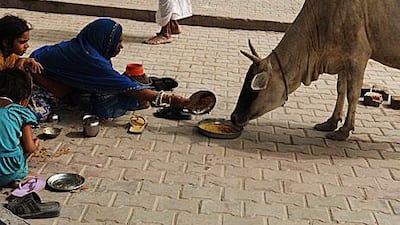NEW DELHI // Their dung blocks nuclear radiation, their milk makes children more obedient, touching them can lower blood pressure - just three reasons given for the introduction in Madhya Pradesh of the toughest penalties in India to protect the cow.
A workshop this week also heard only people who coated their house with cow dung, a popular insulation,survived the 1984 gas leak that killed up to 25,000 in Bhopal, the state capital, the Indian Express reported.
The Cow Protection and Conservation Board workshop was organised to celebrate the new law, which took effect last week.
Under the new law, which took effect last week, anyone convicted of killing a cow or taking it interstate to be killed can be jailed for up to seven years. The law also empowers police to enter a home if they suspect a cow crime has been, is being or is likely to be, committed, raising fears it could be used to harrass minority Muslims.
The state government, led by the Hindu nationalist Bharatiya Janata Party (BJP), insists the move is to protect the sanctity of the cow and fixes problems in an earlier law.
Academics say it may be a cynical move to bolster support for the party and the chief minister, Shivraj Singh Chauhan, who also announced the government would spend almost US$100 million (Dh367m) on a "mega-cow pen" to provide better conditions for young calves.
An article in The Hindu newspaper yesterday made a pointed comparison to the condition of people in Madhya Pradesh, which has the country's highest rate of infant mortality and lowest rate of literacy.
"The religious feelings of people need to be respected and therefore saving the cow is one of the top priorities of the government," Nagendra Singh, the state public welfare minister, told the paper.
"Let there be no doubt that cow slaughter needs to be stopped, not only in Madhya Pradesh but throughout the country."
The BJP has enacted cow protection laws in several states under its control, but these are considered the most stringent yet.
The law has come into force a decade after riots in the state that erupted when Hindu nationalists took to the streets over reports Muslims were secretly killing cows. The riots helped bring the BJP to power in Madhya Pradesh a year later, in 2003.
The BJP's campaign against cow slaughter is seen by some analysts as part of its ongoing attempt to create a pan-Indian nationalism out of the myriad identities that exist in India.
"Outside a small section of modernised Indians, many still think of themselves not as Hindus, but in terms of caste, language and sect," said Ashis Nandy, a leading social theorist with the Centre for the Study of Developing Societies in New Delhi.
Promoting a ban on cow slaughter, he said, "is an attempt to steamroll these other forms of identity and have people think of themselves purely as 'Hindus'. It is a cynical attempt to consolidate political support."
But the sacredness of the cow and the Hindu belief that eating beef is a sacrilege is not without its questioners.
DN Jha, a retired professor from Delhi University, said the idea spread only in the 19th century as a way of targeting Muslims. His book, The Myth of the Holy Cow, brought him death threats when it was published in 2001.
"This whole concept of the sacred cow is limited to certain communities in certain parts of the northern, Hindi-speaking belt of India," he told The National, adding cows are still eaten by the Dalit community (formerly known as "untouchables"), and even by the highest castes in southern states such as Kerala.
Eating beef is common among Hindus in Nepal and Sri Lanka.
"In the nineteenth century when Indian history was being written along modern lines, it became useful for Indian nationalists who were anti-Muslim to spread this idea that beef-eating was introduced into India by the Muslims, but there is clear evidence that cows were eaten in India long before the coming of Islam."
Follow
The National
on
& Eric Randolph on

